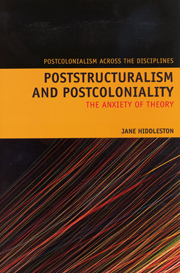Book contents
- Frontmatter
- Contents
- Acknowledgements
- Introduction
- Part One Poststructuralism in Algeria
- 1 Derrida in Exile: Philosophy, Postcolonialism and the Call for a Singular Universalism
- 2 In or Out? The Dislocations of Hélène Cixous
- 3 Lyotard's Algeria: Theory and/or Politics
- Part Two Theory and Cultural Difference
- Conclusion
- Bibliography
- Index
2 - In or Out? The Dislocations of Hélène Cixous
from Part One - Poststructuralism in Algeria
- Frontmatter
- Contents
- Acknowledgements
- Introduction
- Part One Poststructuralism in Algeria
- 1 Derrida in Exile: Philosophy, Postcolonialism and the Call for a Singular Universalism
- 2 In or Out? The Dislocations of Hélène Cixous
- 3 Lyotard's Algeria: Theory and/or Politics
- Part Two Theory and Cultural Difference
- Conclusion
- Bibliography
- Index
Summary
If texts such as Derrida's De la grammatologie and ‘Circonfession’ revolve in different ways around the inscription of alterity into philosophy, then Hélène Cixous's work too has from the beginning been preoccupied with the unstable borders between inside and outside, self and other. Born in Oran, Algeria, and considered now as one of the major thinkers of the French feminist movement of the 1970s, Cixous is in particular continually uneasy about the frontiers of the territories, and the cultural and generic categories, to which her life and work have been seen to belong. Her first novel, Dedans, explores the narrator's enclosure within the family home, within the Algerian Jewish community and within a prelinguistic bond, unusually with the father, only to conclude that the spaces of inside and outside cannot be delineated as clearly as would appear. Cixous's later writing about Algeria in texts such as Les rêveries de la femme sauvage similarly emphasises the rigid boundaries enclosing the family within the area of Clos-Salembier, Algiers, and yet she also repeatedly expresses a sense of disjunction or displacement in relation to Algeria more broadly. The text opens with, and persistently repeats, the refrain ‘tout le temps où je vivais en Algérie je rêvais d'arriver un jour en Algérie’, so that residence also implies absence, and the narrator never fully belongs in the territory she nevertheless haunts.
- Type
- Chapter
- Information
- Poststructuralism and PostcolonialityThe Anxiety of Theory, pp. 47 - 76Publisher: Liverpool University PressPrint publication year: 2010

